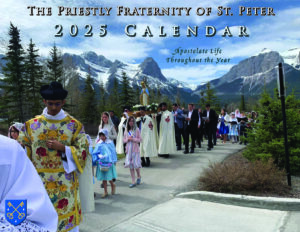Portrait of the Soul Identified with Jesus
The following excerpt is taken from One with Jesus (1953), by Fr. Paul de Jaegher, SJ.
We will here sketch briefly the psychology of a soul whose spiritual life is summed up in this very simple idea: Living for Jesus; or, to be more exact: Allowing Jesus to live in me. This sketch will do more than lengthy reasoning to bring into relief the features of such a soul.
 To begin with, let us see what her manner of prayer is, independently of the mystic state in which she may or may not find herself.
To begin with, let us see what her manner of prayer is, independently of the mystic state in which she may or may not find herself.
It is clear that such a soul no longer prays for her own sake as she did formerly; her prayer is not hers alone; it is, before all, the prayer of Jesus; one might say it is solely his.
She knows well that she does not pray alone, but that her Well-Beloved prays with her. Therefore it is in this disposition that she goes to prayer. With what joy does she now say “Our Father, who art in Heaven”! God is truly for her “our” Father, the Father of Jesus and her own Father.
Assisted by Jesus who lives in her, she instinctively and gradually reproduces the prayer of Jesus on the mountain. She forgets herself, she forgets her narrow interests and the pettiness which she showed in the past, and her prayer becomes expansive beyond measure. When she adores, her adoration is no longer the adoration offered by her own poor little self ; it is the immense worship which Jesus offers within her, in his own name, and in the name of his whole mystical body.
In Jesus and with Jesus she incessantly gives thanks, not so much for the benefits which she has personally received from God, but for those which God has lavished on Jesus and on all his mystical members. Above all, she loves God passionately for Jesus, and, in the Name of Jesus, she loves him also tor those countless millions of men who do not love him, or who, alas, love him too little.
The soul that lives in Jesus’ name is no longer weighed down by thoughts of self, making self the centre of her prayer; nor is her prayer concentrated as heretofore on the correction of her faults and failings; her prayer does not principally consist in begging for graces for herself and others. Her happiness is now to contemplate, to enjoy the infinite perfections of her God or of her well-beloved Jesus.
She loves to lose herself, to forget herself, turning towards God in loving contemplation and admiration of the divine perfections, as Jesus himself used to do in his prayer to his Father during his mortal life. For his divine perfections are henceforth her wealth, her treasure, and in them she will find all her happiness.
Her prayer to Our Blessed Lady is similarly affected: for here again it is Jesus who prays through her. She feels it unmistakably and cannot for a moment forget it. Jesus therefore gives her the love of a child. As formerly, rocked in his Mother’s arms, he loved to caress and embrace her, so in that soul and through her he caresses her still; he embraces her, or rests lovingly in her arms.
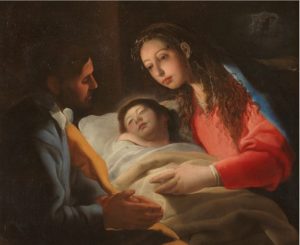 And Mary returns these caresses as she used to return those of her Child Christ. She makes herself so sweet, so delightful, so charming, so intimate, that there are times when the soul is transported with joy, for Mary now so vividly appears to be her mother, her true mother. Our Blessed Lady has become such a living reality to the soul that it seems to her she has never before really known a mother’s love. In the past, Mary meant nothing to her, but now she has truly assumed the office of a mother in her regard. “Ah! I did not know my mother,” the soul at times exclaims, “but now I have found her indeed.”
And Mary returns these caresses as she used to return those of her Child Christ. She makes herself so sweet, so delightful, so charming, so intimate, that there are times when the soul is transported with joy, for Mary now so vividly appears to be her mother, her true mother. Our Blessed Lady has become such a living reality to the soul that it seems to her she has never before really known a mother’s love. In the past, Mary meant nothing to her, but now she has truly assumed the office of a mother in her regard. “Ah! I did not know my mother,” the soul at times exclaims, “but now I have found her indeed.”
These are a few of the principal traits of the prayer of such a soul. But in reality her prayer is not confined to the fixed hours of formal converse with God. The whole day gradually becomes an uninterrupted prayer. Being fully conscious of the presence of Jesus and of his action in her soul, how could she fail to remember him?
Loathing as she does all personal interests and living solely for Jesus and in him, it would be impossible for her not to live continually, or nearly so, with Jesus. In the ardour of her love it seems to her that not to live with Jesus means not to live for him. His companionship alone gives charm and interest to all her actions, of whatever kind they be, and her eager desire to please her Beloved in all things does not permit her to lose sight of him for any length of time.
Who then can express the depth and tenderness of her intimacy with him? She does everything together with the Lover of her soul: she goes to each action hand in hand with him.
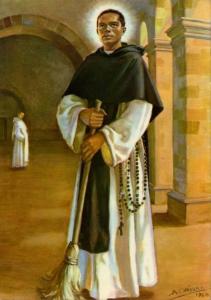
Besides, it is most probable that Jesus himself powerfully helps her to keep alive the remembrance and the consciousness of his Divine Presence. He makes her ascend step by step the degrees of mystical life and prayer, and bestows on her the precious gift of an “active quiet” ever increasing and ever more habitual.
Soon the most distracting occupations cease to absorb her; in her inmost heart she is always actually united with the Master, until she scarcely perceives any difference between the hours of prayer and the hours of work or recreation.
July 26, 2021

Official Communiqué Following the Publication of the Motu Proprio Traditionis Custodes
The FSSP’s General House in Fribourg, Switzerland has released a statement on the motu proprio Traditionis Custodes.
Fribourg, July 20, 2021
The Priestly Fraternity of St. Peter, whose goal is the sanctification of priests through the faithful observance of the liturgical traditions prior to the reform implemented after the Second Vatican Council (cf. Constitutions n. 8), has received Pope Francis’ Motu Proprio Traditionis Custodes with surprise.
Founded and canonically approved according to the Motu Proprio Ecclesia Dei Adflicta of Pope St. John Paul II of July 2, 1988, the Priestly Fraternity of St. Peter has always professed its adherence to the entire Magisterium of the Church and its fidelity to the Roman Pontiff and the successors of the Apostles, exercising its ministry under the responsibility of the diocesan bishops. Referring in its Constitutions to the teachings of the Second Vatican Council, the Fraternity has always sought to be in accord with what Pope Emeritus Benedict XVI called in 2005: “the hermeneutic of reform in the continuity of the Church” (Address to the Roman Curia, December 22, 2005).
Today, therefore, the Fraternity of St. Peter is deeply saddened by the reasons given for limiting the use of the Missal of Pope St. John XXIII, which is at the center of its charism. The Fraternity in no way recognizes itself in the criticisms made. It is surprising that no mention is made of the many fruits visible in the apostolates attached to the missal of St. John XXIII and the joy of the faithful in being able to benefit from this liturgical form. Many people have discovered or returned to the Faith thanks to this liturgy. How can we fail to notice, moreover, that the communities of the faithful attached to it are often young and flourishing, and that many Christian households, priests or religious vocations have come from it?
In the current context, we wish to reaffirm our unwavering fidelity to the successor of Peter on the one hand, and on the other, our desire to remain faithful to our Constitutions and charism, continuing to serve the faithful as we have done since our foundation. We hope to be able to count on the understanding of the bishops, whose authority we have always respected, and with whom we have always collaborated loyally.
Confident in the intercession of Our Lady and our Patron, Saint Peter, we hope to live this trial in faith and fidelity.
July 21, 2021

Liturgical Practices – Immutable Divine or Changeable Human?
by Fr. William Rock, FSSP.
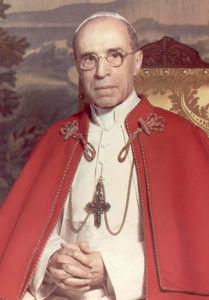
“The sacred liturgy does, in fact, include divine as well as human elements. The former, instituted as they have been by God, cannot be changed in any way by men. But the human components admit of various modifications…” These words are found in paragraph 50 of Mediator Dei, an encyclical on the Sacred Liturgy, promulgated by Pope Pius XII in 1947. This same concept is echoed in paragraph 21 of Sacrosanctum Concilium, the Constitution on the Sacred Liturgy promulgated by the Second Vatican Council (1963): “For the liturgy is made up of immutable elements divinely instituted, and of elements subject to change.”
The most immediate understanding of the “immutable elements divinely instituted” are the fundamental matter and form of the Sacraments. The Church has no authority to change these. But does that then mean that everything else is the “human elements” which can be changed? One may be tempted to say “yes, everything besides the matter and form of the Sacraments are ‘human elements’ which can be freely changed by the Church’s hierarchy.” But is this really the case?
In the Acts of the Apostles, St. Luke wrote “Now there were in the church which was at Antioch prophets and doctors…And as they were ministering to the Lord and fasting, the Holy Ghost said to them: Separate me Saul and Barnabas, for the work whereunto I have taken them” (Acts 13:1-2). It is important to note that the Greek word translated as ministering (λειτουργέω) is used in the Septuagint (the Greek translation of the Old Testament in use at the time of Our Lord and the Apostles) in connection with liturgical worship. This interpretation – that these prophets were conducting liturgical services – is supported by Cornelius a Lapide in his commentary on these passages. These prophets, then, in the passage of Acts just quoted, were conducting liturgical services.
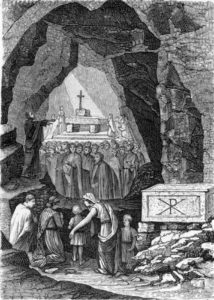
From Acts, a Lapide directs his readers to 1 Corinthians 14 for a further explanation of the role of these prophets. He explains that “the Apostle [Paul] is describing in this chapter [1 Cor 14] everything that took place then in the public assemblies of the Church.” The commentary explains that by “the name of prophets [St. Paul] means those who were filled with the Holy Spirit, and received from Him some revelation of doctrine, or word of exhortation, or of prayer.” To these prophets “the Holy Spirit would give the power of expounding Holy Scripture, or of teaching or preaching, or of singing, or of leading the people in exalted prayer in the vulgar tongue.”
According to a Lapide, these prophets of the Apostolic age had a central role in the liturgical life of the early Church. But once the Church was sufficiently established and such gifts became rare, the ceremonies became more fixed, relying more on Sacred Scripture. But does this mean all of what was done by and through these prophets, their prayers and hymns, were completely discarded? If they were not, if they continued to be used in the churches and then handed down through history, should these be considered immutable divine elements or changeable human elements? After all, they were instituted by the Holy Ghost through prophets. And further, could they even now be discerned and thus marked out from the rest of the liturgical texts?
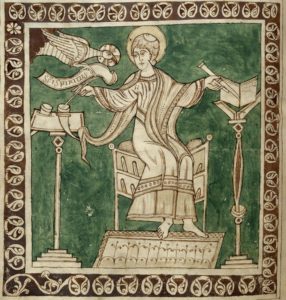
But what about the developments of the liturgy in the post-Apostolic age of the Church? The Christian liturgies have not remained static since the death of the Apostles and prophets. They have, rather, grown and developed. St. Thomas, in addressing whether the actions performed during the celebration of Mass are becoming, stated that “the custom of the Church stands for these things: and the Church cannot err, since she is taught by the Holy Ghost” (S.T. III, q. 83, a. 5, s.c.). It was St. Thomas’ conviction, and one that was apparently widely held based on his use of it in the Summa (as the “sed contra” arguments were generally short arguments from accepted authorities), that the Holy Ghost guides the development of the Liturgy over time.
This conviction of St. Thomas is implied by Dom Prosper Guéranger in the general preface to his Liturgical Year where he wrote that it was his aim “to show what is the spirit which the Holy Ghost has put into each of the several periods of the liturgical year” for various elements of the liturgy reflect the thoughts which “our Lord Jesus Christ, Who is the Wisdom of God, dictates by the Holy Ghost to His well-beloved bride the Church!” It was the Holy Ghost Who, through men, guided the development of the Christian Liturgy over the course of its history.
While His influence may not have been as dramatic and evident as was His influence through the New Testament prophets, the Holy Ghost continued, in the post-Apostolic age, to develop the liturgy. As the Holy Ghost guided the development of the ceremonies of the historical Christian Liturgies, then to what category would these belong – the immutable divine or changeable human? Or perhaps they belong to neither and rather to a third category.
While this article raises more questions than it answers, it should make one thing clear – that the distinction between the immutable divine and changeable human elements of the Liturgy is not as readily evident and clear-cut as might have first been thought. A certain deference should, consequently, be shown to the historical Christian liturgies as they have been handed down, for they are not simply the products of human ingenuity.
Fr. William Rock, FSSP was ordained in the fall of 2019 and is currently in residence at Regina Caeli Parish in Houston, TX.
July 15, 2021

A White Martyrdom Turned Red – Part 2
The account of St. Maria Goretti is not simply one of good versus evil. Rather, it further serves to bring to the forefront that her sanctity was not based on that one single moment of her attack. That was the culmination of something already there. The reason she was to obtain the palm of martyrdom was because of her fidelity to the path of preparation God’s Providence had provided from her early years. In spite of the horror of the tragedy, we receive a saint for our altars, the conversion of at least one hardened soul (of which we know heaven rejoices over), and a model for youth, both in piety and purity. Juxtaposed against the devout Goretti family are the two Serenelli’s, the wheat and weeds intermixed we may think, and a great deal of suffering because of that, yet we find reason as to why the weeds are not pulled out until harvest (cf. Mt. 13:29).
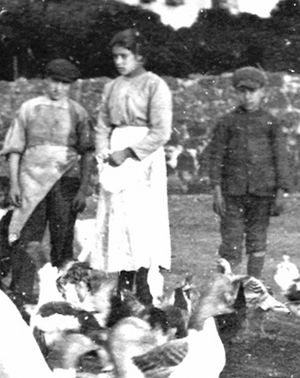 Little Maria learned early to offer all things in union with Christ; that came from her parents in the form of a devout father with an honest work ethic, and an even more devout mother committed to her husband and children, no matter what the cost. Prayers and Mass were important, they were operative in the family. Luigi and Assunta Goretti knew they did not need much, because they had each other in union and partnership with Christ. Their marriage was certainly not perfect; no doubt there was a return back to the Author of their marriage every day and a seeking of Him through their trials, of whose weight was particularly heavy.
Little Maria learned early to offer all things in union with Christ; that came from her parents in the form of a devout father with an honest work ethic, and an even more devout mother committed to her husband and children, no matter what the cost. Prayers and Mass were important, they were operative in the family. Luigi and Assunta Goretti knew they did not need much, because they had each other in union and partnership with Christ. Their marriage was certainly not perfect; no doubt there was a return back to the Author of their marriage every day and a seeking of Him through their trials, of whose weight was particularly heavy.
For Maria, this example taught her the value of patience, it taught her the love of the Cross and how to love like Christ, with firm commitment and resoluteness. In return she was given to realize the gifts Christ had given her, most notably – after her Faith – her purity. Blessed are the pure of heart, they shall see God. And why?
Because purity is synonymous with clarity, the pure and chaste heart strengthens faith, giving insight into God’s work and into the mysteries of redemption. Sense is readily made of trials and crosses, and one experiences a closeness to God that permits trials to be borne to even heroic degrees because of the perceived union it leads to with Him; one does not give up under duress. As a result, a pure and chaste heart strengthens the conscience. Alessandro became fixated on one thing and was enslaved to it, and eventually was unable to stand the presence of innocence; St. Maria, quite to the contrary, was free and for that reason was able to receive the grace to make that final heroic act for love of God.
Even more so, this strength of faith and perfection of charity is demonstrated in Maria’s simplicity – in the midst of a violent attack, there was no time for nuances and justifications. Maria did not think to herself that Alessandro was justified in what he was doing – after all, he did not have it as good as she did, his mother went insane and neglected him, his father was a drunk, siblings didn’t care, and he got in with the wrong crowd. No.
She warned Alessandro of damnation for his actions. Right was right and wrong was wrong. There is a law of God, and for her it was God before sin, and her resistance was not only for her personal welfare, but so as to not render herself a stumbling block to his salvation. Is not such the entire point of modesty?
 St. Maria Goretti demonstrates then that the devout life is a holistic life. Everything is connected – all the virtues work together. Her purity and modesty were fruits of her charity – her love for God and the Cross – that had matured from her generous spirit of sacrifice for love of neighbor, and God would ask of it from her in a heroic way to save the soul of Alessandro.
St. Maria Goretti demonstrates then that the devout life is a holistic life. Everything is connected – all the virtues work together. Her purity and modesty were fruits of her charity – her love for God and the Cross – that had matured from her generous spirit of sacrifice for love of neighbor, and God would ask of it from her in a heroic way to save the soul of Alessandro.
Some words, then, of Pope Pius XII from her canonization should serve to inspire us all:
Why has Maria Goretti so quickly conquered hearts? The reason is because there is still in this world, apparently sunk and immersed in the worship of pleasure, not only a meager little band of chosen souls who thirst for heaven and its pure air – but a crowd, an immense multitude on whom the supernatural fragrance of Christian purity exercises an irresistible and reassuring fascination. During the past fifty years, coupled with what was often a weak reaction on the part of decent people, there has been a conspiracy of evil practices, propagating themselves in books and illustrations, in theaters and radio programs, in styles and clubs and on the beaches, trying to work their way into the hearts of the family and society, and doing their worst damage among the youth, even among those of the tenderest years in whom the possession of virtue is a natural inheritance. Dearly beloved youth, young men and women, who are the special object of the love of Jesus and of us, tell me, are you resolved to resist firmly, with the help of divine grace, against every attempt made to violate your chastity? All of you who are intently listening to our words, know that above the unhealthy marshes and filth of the world, stretches an immense heaven of beauty. It is the heaven which fascinated little Maria; the heaven to which she longed to ascend by the only road that leads there, which is, religion, the love of Christ, and the heroic observance of his Commandments.
July 13, 2021

A White Martyrdom Turned Red – Part 1
 On July 6, 1902, in a small rural Italian town, a young girl of twelve named Maria was forcibly propositioned by a twenty-year old family acquaintance named Alessandro. In her valiant resistance, Maria was stabbed several times, later to die from her injuries. Almost fifty years later, little Maria would be canonized by Pope Pius XII as a martyr of purity at what was then the largest crowd ever for a canonization.
On July 6, 1902, in a small rural Italian town, a young girl of twelve named Maria was forcibly propositioned by a twenty-year old family acquaintance named Alessandro. In her valiant resistance, Maria was stabbed several times, later to die from her injuries. Almost fifty years later, little Maria would be canonized by Pope Pius XII as a martyr of purity at what was then the largest crowd ever for a canonization.
The account of St. Maria Goretti is hardly a fairy tale, and it is a fascinating fact that Maria’s elderly mother, Assunta, was present at her daughter’s canonization, along with her attacker, who by then was nearly seventy years old. We can only wonder the emotions of a mother under such circumstances – perhaps a combination of extremes – a good measure of euphoria intermixed with profound sorrow as she recalled the events surrounding her daughter’s death.
In 1897, when Maria was only six, her father Luigi, an exceptionally hard-working and devout Italian peasant farmer, relocated his family of (then) four children to a small village south of Rome, with the hope of finding more suitable work to better provide for his family. The Goretti’s never knew anything more than abject poverty. Life was hard and uncertain, but despite that they were a happy family grounded firmly in the holy Faith; prayer and Mass were quite regular, and Maria demonstrated a maturity of a devout life from an early age. She could be playful and sweet, but was generally of more serious demeanor, and was not one complain much; she took her Faith and prayers to heart. The family made the two-hundred-mile journey over mountains in the summer heat in just two weeks, and Luigi was able to secure work for a landowner, draining marshes and turning them into farmland. In return, they were given a place to live and a profit-share of the crops. Assunta quickly began transforming the run-down house into a home; the children helped out in whatever way they could.
Within a few months, Luigi remarkably managed to drain eight acres of land and plant the new fields with wheat and barley. The backbreaking work wore him down physically, and there was constant threat of malaria in that region. He ignored the symptoms and continued to keep up his pace; but although God forgives, nature does not, and it all eventually caught up with him. Becoming too ill to work right at harvest time, the Goretti’s landlord hired Giovanni Serenelli and his youngest son, Alessandro, to finish the work. Giovanni was more than willing to work with Luigi but would be entitled to half the profit and enjoy a communal life with the Goretti’s. There was no choice in the matter, but in spite of disappointment at the prospect, things worked out well at the start. Luigi recovered sufficiently and the two men worked well together; the Goretti children just loved Alessandro.
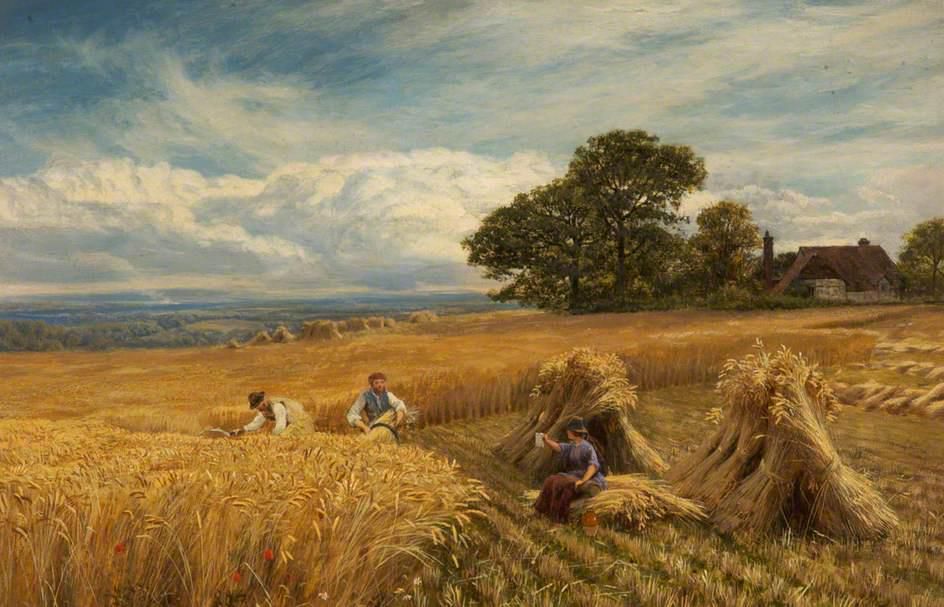
But Giovanni had his own unresolved baggage: his wife had died some years earlier in an asylum, one of his other sons was an inmate there, and the rest of his children had gone the way of the world; only Alessandroremained. As time went on with the Goretti’s, Giovanni took to the bottle, and became increasingly more irritable and overbearing, causing much stress for Luigi. He did not complain much, but as the next few years passed, the toll it took on him was evident, more because of the burden it placed on his family than anything else.
As mentioned, Maria’s faith and piety was well beyond her years; her personal purity and modesty lended a certain presence to her. She had become so used to sacrifice that she actually got the town baker angry at her once when she put a cookie he gave her to enjoy in a bag to give to one of her siblings; seeing how he was offended, she took it out and ate it in front of him. During this same time interval, Alessandro developed his own problems. The years of maternal neglect coupled with bad companions during his youth made him vile, hostile, and sullen. He began to shun the Goretti children and soon began spending most of his times locked up in his room brooding over trashy magazines. Maria quickly grew sensitive to his change in demeanor; her mother even found the trash when cleaning his room, and although concerned about Alessandro’s influence on her oldest son, took no action in order not to bring further trouble into the home. This continued for four years.
By April 1902, fatigue and malaria would claim Luigi’s life. Giovanni became the master of the farm, and by this time he was a harsh and ruthless man. The Goretti’s were permitted to stay and work for him. Left with no choice but to stay, Assunta, who had seven children now, was then forced to work in the field with the boys, leaving Maria, now twelve, with all the housework. For Maria, her father’s long illness and death, Giovanni’s cruelty, and the never-ending work made her quite serious for her age, so much so that the village children referred to her as the “little old lady.” Her mother noticed it, too, but could only do so much to give her daughter relief.
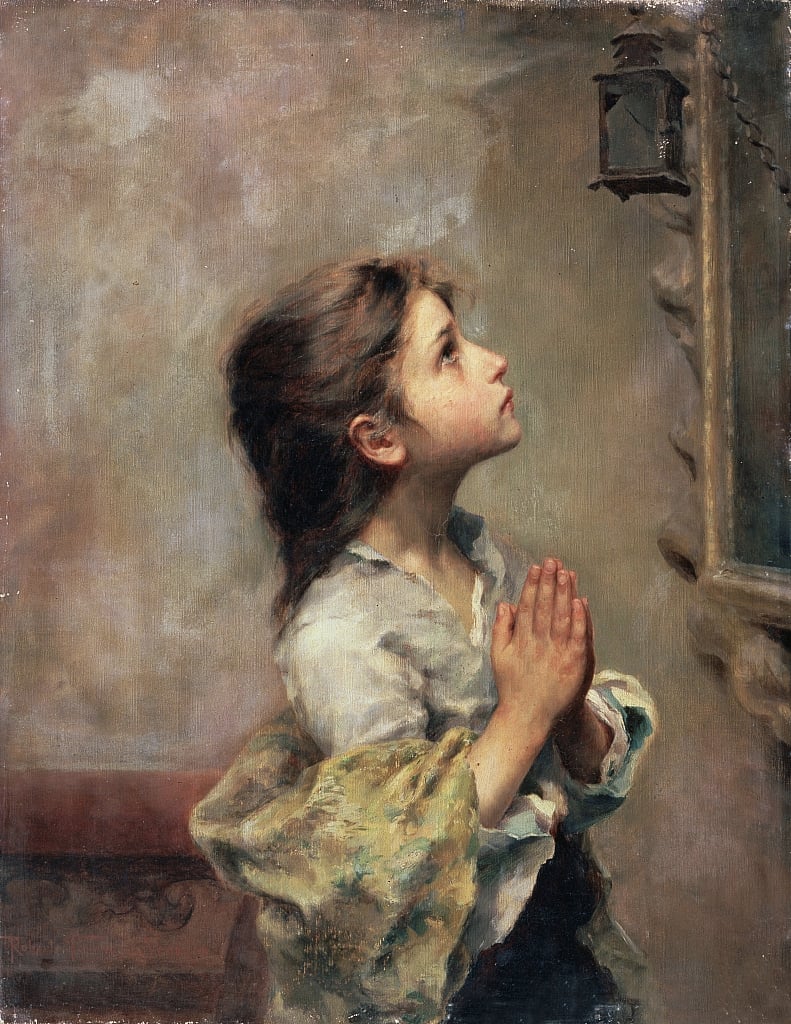 Nonetheless, Maria found needed solace with God, and would spend large amounts of time in prayer at night. She concealed her tears in her prayers, and her devotion to Christ’s Passion and her obedience to her mother were extraordinary. Interestingly enough, in his later years, Alessandro recalled how Maria’s piety always impressed him, remarking that when she prayed, she really looked like she meant what she said. But for the time at hand, Maria felt much threatened by Alessandro; he had been stalking her for a while with evil intent, and she lived in fear of him. However, she kept this to herself, fearful of repercussions from Giovanni and not wishing to add to her mother’s worry.
Nonetheless, Maria found needed solace with God, and would spend large amounts of time in prayer at night. She concealed her tears in her prayers, and her devotion to Christ’s Passion and her obedience to her mother were extraordinary. Interestingly enough, in his later years, Alessandro recalled how Maria’s piety always impressed him, remarking that when she prayed, she really looked like she meant what she said. But for the time at hand, Maria felt much threatened by Alessandro; he had been stalking her for a while with evil intent, and she lived in fear of him. However, she kept this to herself, fearful of repercussions from Giovanni and not wishing to add to her mother’s worry.
On July 6, the day before her first Communion, while alone at the house with her baby sister, Maria was attacked at knifepoint by Alessandro. All the while during the attack, Maria’s concern above her own integrity was the soul of Alessandro, screaming at him that it was a sin, that God forbade it, and he would go to hell for it. He stabbed her in anger and fled. Maria lived for twenty more hours. The local priest came to administer the last rites; before giving her First Communion, he reminded her of Christ’s pardon of those who crucified him, and without the least anger or resentment, said that she pardoned her murderer. Alessandro was quickly apprehended, tried, and sentenced to thirty years solitary confinement.
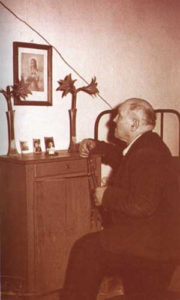
He was angry and uncooperative for the first eight of those years, until the night he had a dream where he attests that he saw Maria gathering lilies; as she handed them to him, he became aware of a tremendous peace that could only come with forgiveness.
He repented sincerely and was a model prisoner for the rest of his sentence. Assunta forgave him as well with the same heartfelt sincerity, and he spent the rest of his life in penance working at local monasteries. He would die in May 1969.
July 8, 2021

St. Michael’s Scranton Welcomes Fathers Komorowski and Lawrence
This past Sunday, July 4th, St. Michael’s parish in Scranton, Pennsylvania enjoyed a rare liturgical treat.
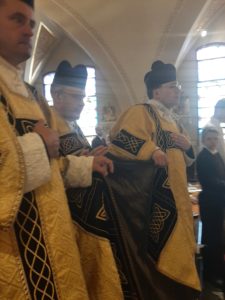
Pastor Simon Harkins welcomed the Fraternity’s Superior General, the Very Rev. Fr. Andrzej Komorowski, and new North American Provincial Fr. William Lawrence for a special Solemn High Mass. Fathers Komorowski and Lawrence are both in town for the Provincial Chapter meetings to organize the governance of the new North American Province.
The Mass was of the FSSP Patronal feast of Ss Peter and Paul, transferred to Sunday because St. Peter also happens to be the patron of the Scranton diocese. To have the FSSP leadership on hand for this double-patronal feast was an immense blessing.
Fr. Komorowski offered solemn High Mass, with Fr. Harkins as deacon. Fr. Lawrence served as subdeacon, in his first public liturgical event as Provincial.
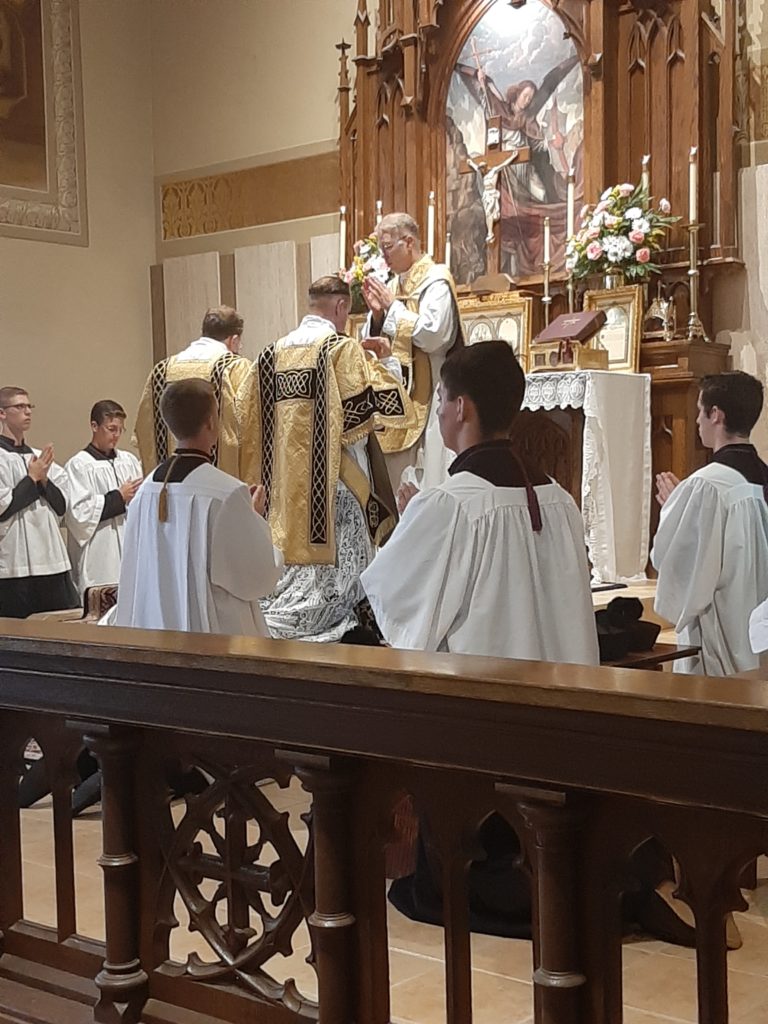
After welcoming the Fraternity leadership to St. Michael’s, Fr. Harkins gave a homily relating the feast of St. Peter to the July 4th holiday, and giving us a well-needed reminder that true independence comes not from the state but from God.
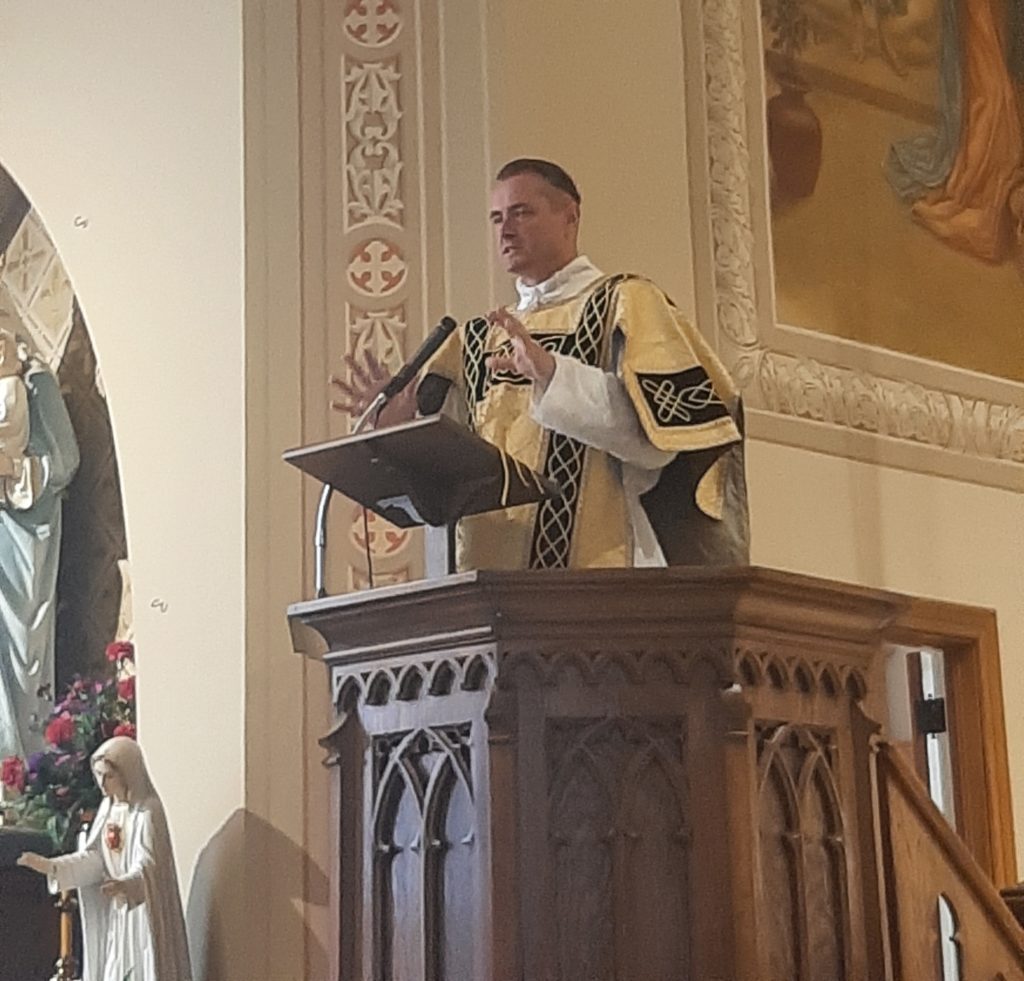
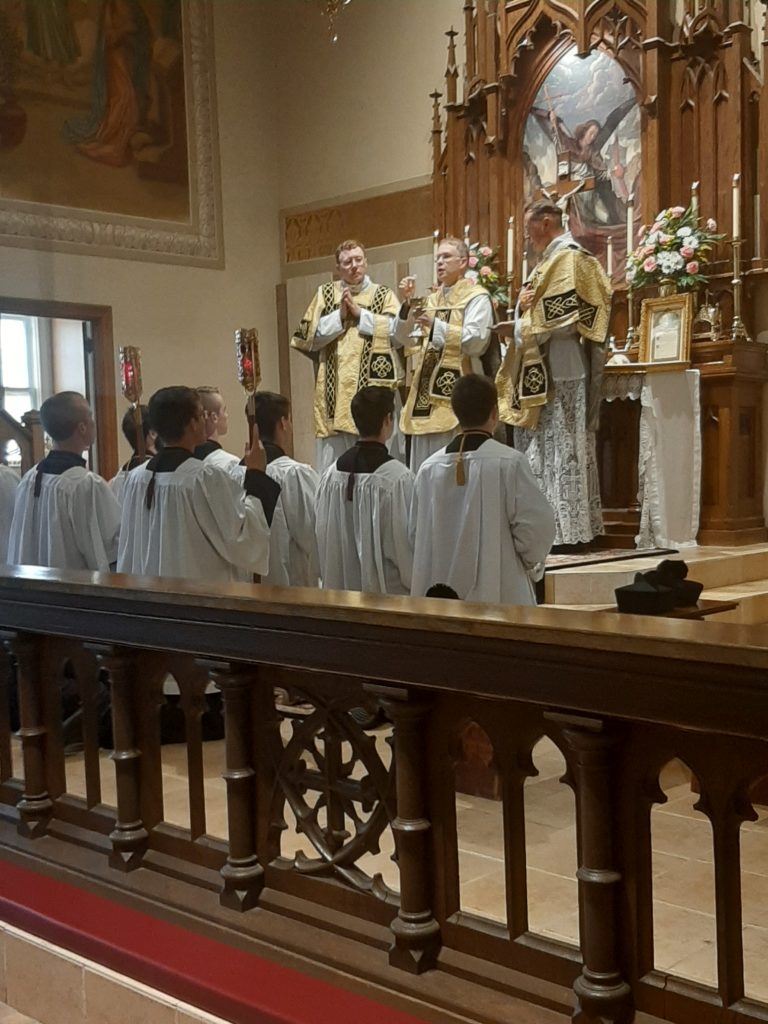
St. Michael’s Choir sang at its last High Mass of the season before a much-deserved summer break.
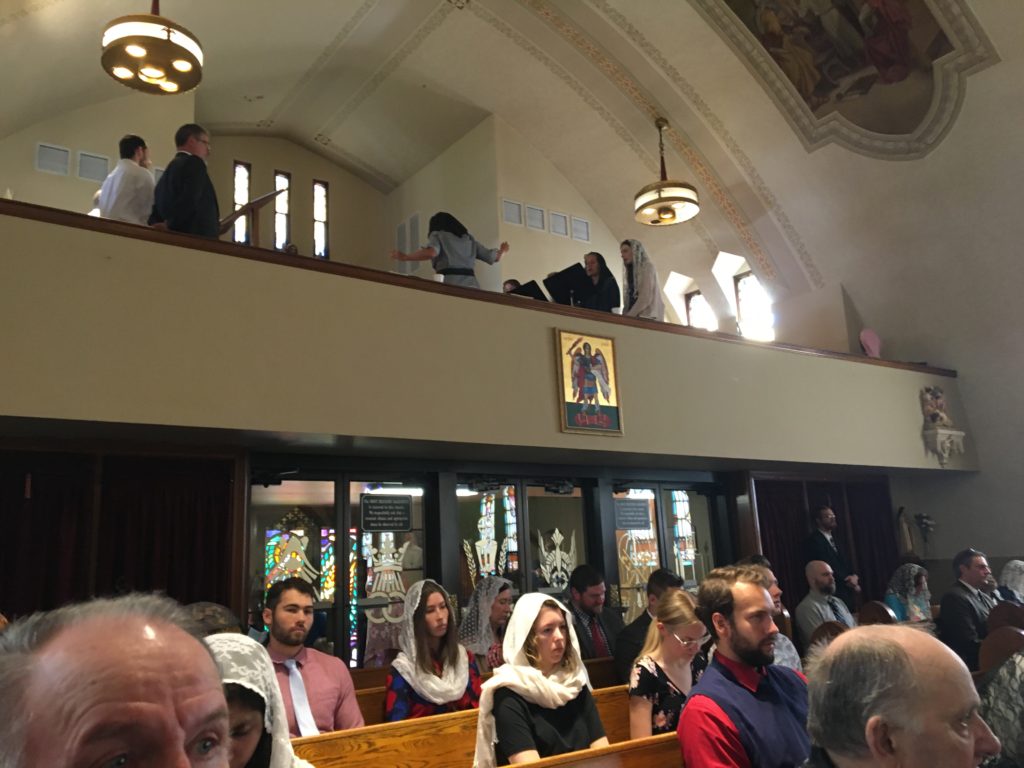
After Mass, the faithful gathered in the basement for coffee and doughnuts as well as delightful conversations with all three priests.
Many thanks to Fr. Komorowski and Fr. Lawrence for coming to visit St. Michael’s, and to Fr. Harkins for setting up this wonderful Mass.
July 6, 2021

Blood Transfusion
All of us run into some kind of dilemma in our lives when we are faced with acts of generosity from another which really cannot be repaid anywhere close to the measure it was given.
“Thank you” hardly does the job, and although we extend a heartfelt word of gratitude out of charity, we feel silly about it and express some wish that there was something more of substance that could be done. But at the same time though, in such circumstances there often is a level of inequality between the person who gives and the person who receives.
Like in the case of parents, because certain things cannot be given to another without long years of preparation and sacrifice, the expectation of return does not include an exact or equal repayment because such would be impossible and impractical. Rather, the best and most satisfying response of gratitude involves learning how to give in a way similar to which the original benefit or gift was given.
Obviously though, the more perfect the gift, the greater we sense an obligation to this kind of response of gratitude, which really amounts to a more generous giving of self.
What then is to be said about the Blood of Jesus Christ? Can there be any more perfect gift from God?
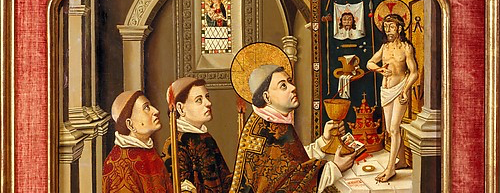
Unfortunately, man does not usually realize that because we do not want salvation enough.
Like in all things, there had to be a donation of one life for the sake of the life of another, and so when we are confronted with the reality that, in God’s Providence, the shedding of Christ’s Blood – the very life of His Body – was required for our sins to be forgiven, we find ourselves at a loss about what to say.
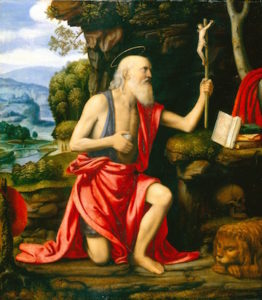
What do we say when confronted with the infinite depths of Christ’s love as depicted on the crucifix? Only with a supernatural spirit of humility are we able to make any response.
True, it is impossible to repay Christ as He deserves, but He is not looking for that.
Instead, our Lord gives us the answer: If ye love Me, keep My commandments.
That is what He wants in return for His Blood, words which He said to the Apostles at the Last Supper, an instruction given to His Church of which we are members of through Baptism, and words which carry the reward of God’s grace in our souls. Strive to live uprightly, to live morally, to be challenged by the crucifix so as to know ourselves as God knows us: the Blood of Jesus Christ was powerful enough to save man from sin an infinite times over, and so it greatly pleases our Lord, who shed His Blood freely, when we have confidence in this saving power and call upon Him with confidence for the conversion of our souls.
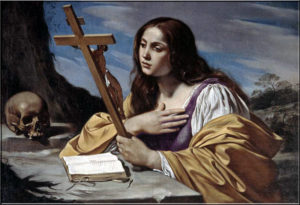 If the crucifix makes us feel a bit guilty initially, well, it should, but only continues to do so if we play games with God.
If the crucifix makes us feel a bit guilty initially, well, it should, but only continues to do so if we play games with God.
That is when we avoid it, when we prefer to not think about Christ and His Blood. A miserable state indeed since it is not supposed to stop there. Our Lord wants this keeping of the Commandments to be motivated by charity, not fear: Learn from Me for I am meek and humble of Heart and you will find rest for your souls.
There is no true rest if we live in fear, if we coddle a sin our Lord’s Blood can easily clean if we are only a little more generous with our admission of it and our purpose of amendment. Rest is quite real if we are in love, because in all we do and say we seek to possess and strengthen our relationship with God. But this only happens courtesy of the Blood of Christ, and so this response to our Lord’s Blood is a continual process, only possible by the daily dying to self in the hundreds of little ways that come up in our day – the effort, first and foremost to avoid mortal sin, and, after that, using prayer and the Sacraments regularly to know ourselves so to avoid deliberate venial sin.
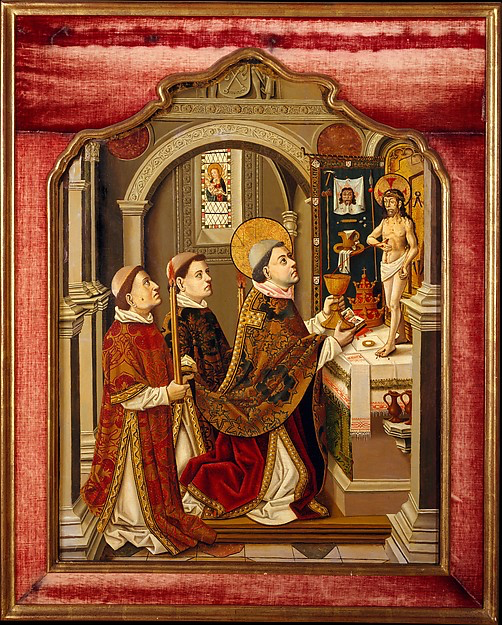
To the degree we believe that our happiness is with God, that man stood and continues to stand in need of salvation, that God had been offended by sin and amends had to be made, and that we are powerless by ourselves, is the degree we believe that God has put in place means for this to be accomplished through the shedding of the Blood of His only Son, and it is something we will gladly spend our life making known to those who know it not.
What benefit they will have if given the grace to believe in the Blood that saved them! How we stand as beneficiaries of God’s generosity – life given so life can be received – and how it all comes back around if we are generous in our gratitude we owe to God.
Blood that but one drop of has the power to win, all the world forgiveness of its world of sin.
Blood of Christ, strength of confessors, save us!
July 1, 2021

North American Provincial Chapter Meeting Begins Today
On this Feast of the Precious Blood, the Fraternity asks for your prayers as it holds its Chapter meetings to transition the North American District into the new North American Province. The meetings begin today and will extend to July 10th.
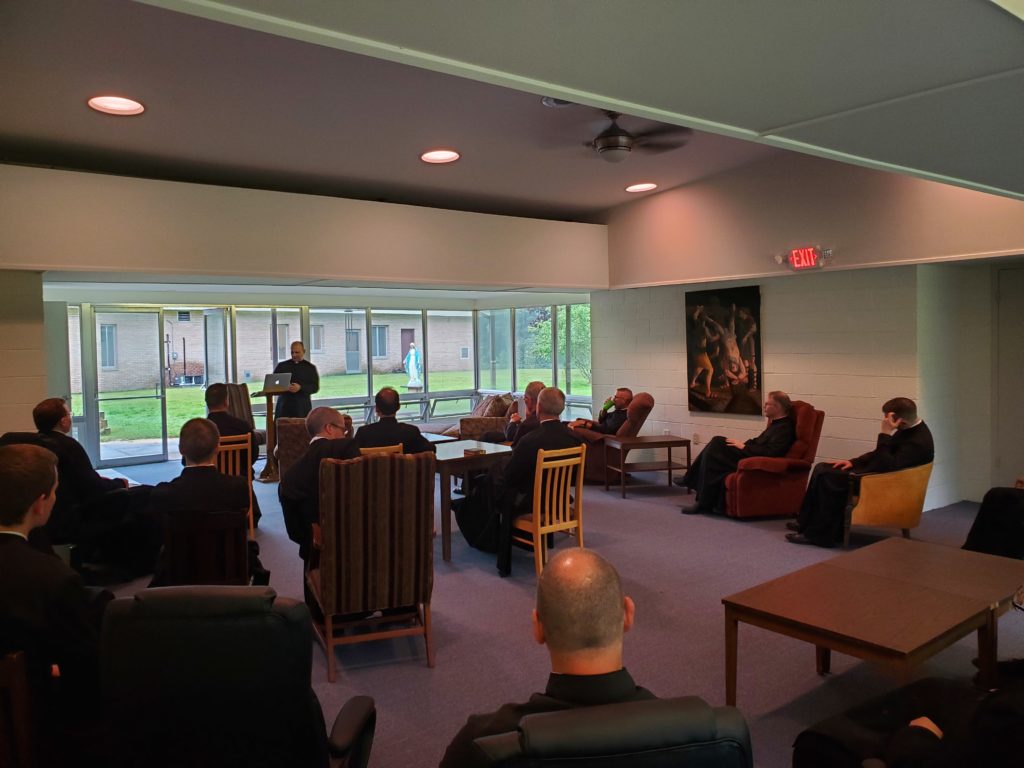
At the parish level, FSSP communities will not see much change.
The differences will primarily be administrative. A provincial superior has ordinary power, whereas a district superior does not. The province will be able to handle things such as priest assignments, without having to refer them up to the Superior General. Overall, it makes the administration of the FSSP in North America easier and more localized.
This change is a great testament to the growth of the FSSP in North America, especially at a time when many religious orders are consolidating existing provinces rather than forming new ones.
Today at the Chapter meeting, there is recollection and a special consecration of the Province to the Immaculate Heart of Mary.
Please pray for the priests and seminarians in attendance, that the chapter meetings may be filled with the light of the Holy Ghost.
| Veni, Sancte Spíritus, reple tuórum corda fidélium, et tui amóris in eis ignem accénde.
V. Emítte Spíritum túum et creabúntur. R. Et renovábis fáciem terræ. Orémus. Deus, qui corda fidélium Sancti Spíritus illustratióne docuísti: da nobis in eódem Spíritu recta sápere, et de eius semper consolatióne gaudére. Per Christum Dóminum nostrum. Amen. |
Come, Holy Ghost, fill the hearts of Thy faithful and kindle in them the fire of Thy love.
V. Send forth Thy Spirit and they shall be created. Let us pray. O God, Who taught the hearts of the faithful by the light of the Holy Spirit, grant that, by the gift of the same Spirit, we may be always truly wise, and ever rejoice in His consolation. Through Christ our Lord. Amen. |
| Veni, Creátor Spíritus,
mentes tuórum vísita, imple supérna grátia quae tu creásti péctora. Qui díceris Paráclitus, altíssimi donum Dei, fons vivus, ignis, cáritas, et spiritális únctio. Tu, septifórmis múnere, dígitus patérnae déxterae, Tu rite promíssum Patris, sermóne ditans gúttura. Accénde lumen sénsibus: infúnde amórem córdibus: infírma nostri córporis virtúte firmans pérpeti. Hostem repéllas lóngius, pacémque dones prótinus: ductóre sic te prǽvio vitémus omne nóxium. Per te sciámus da Patrem, noscámus atque Fílium; Teque utriúsque Spíritum credámus omni témpore. Deo Patri sit gloria, et Fílio, qui a mórtuis surréxit, ac Paráclito, in sæculórum sǽcula. Amen. V. Emítte Spíritum túum, et creabúntur. R. Et renovábis fáciem terrae. Orémus. Deus, qui corda fidélium Sancti Spíritus illustratióne docuísti: da nobis in eódem Spíritu recta sápere; et de eius semper consolatióne gaudére. Per Christum Dóminum nostrum. Amen. |
Come, Holy Ghost, Creator blest,
Vouchsafe within our souls to rest; Come with Thy grace and heavenly aid And fill the hearts which Thou hast made. To Thee, the Comforter, we cry, To Thee, the Gift of God Most High, The Fount of life, the Fire of love, The soul’s Anointing from above. The seven-fold gifts of grace are Thine, O Finger of the Hand Divine; True promise of the Father Thou, Who dost the tongue with speech endow. Thy light to every thought impart And shed Thy love in every heart; Our body’s poor infirmity With strength perpetual fortify. Our mortal foe afar repel, Grant us henceforth in peace to dwell; If Thou be our preventing Guide, No evil can our steps betide. Make Thou to us the Father known, Teach us th’ Eternal Son to own, And Thee, Whose Name we ever bless, Of Both the Spirit, to confess. All glory while the ages run, Be to the Father and the Son, Who rose from death; the same to Thee, O Holy Ghost, eternally. Amen. V. Send forth Thy Spirit and they shall be created. R. And Thou shalt renew the face of the earth. Let Us Pray. O God, Who taught the hearts of the faithful by the light of the Holy Spirit, grant that, by the gift of the same Spirit, we may be always truly wise, and ever rejoice in His consolation. Through Christ our Lord. Amen. |

Ss Peter and Paul video 2021
Our new video for the Ss Peter and Paul appeal, featuring our newly ordained priests.
June 29, 2021

Pray for the New Province, with FSSP Baltimore
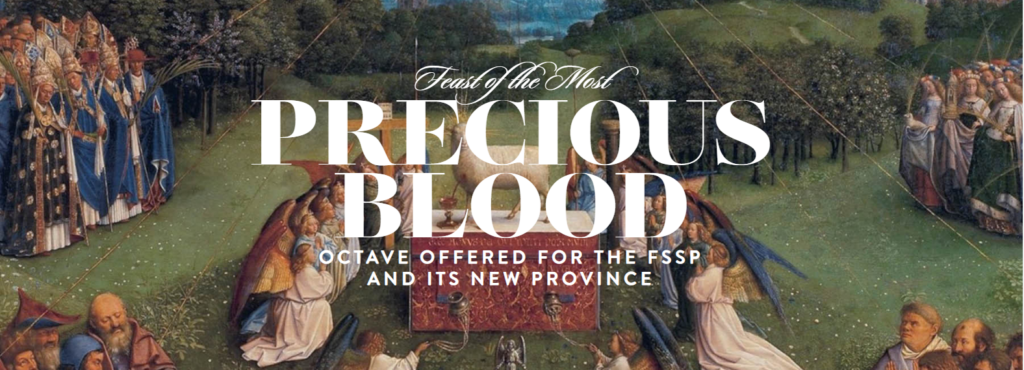
The Fraternity’s apostolate in Baltimore, the National Shrine of Saint Alphonsus Liguori, is offering an octave of Masses beginning with the Feast of the Most Precious Blood in thanksgiving for the establishment of the new North American Province and to implore God’s graces, protection, and guidance for the Fraternity, its new Provincial, and its priests during their first Provincial Meeting. They invite you to enroll your own intentions, specific or general, for your local parish and priests, for the Fraternity, for its leadership, and for its seminarians in the Masses offered on this special and auspicious feast day and throughout the week following. Your intentions will be placed in a gold box on the first gradine of the altar during the Masses offered for them.
Visit the website to submit your intentions or to watch the High Mass as it is broadcast live beginning at 7pm on 1 July:
https://stalphonsusbalt.org/preciousblood
Christum Dei Filium, qui suo nos redemit sanguine, Venite adoremus!
June 28, 2021








